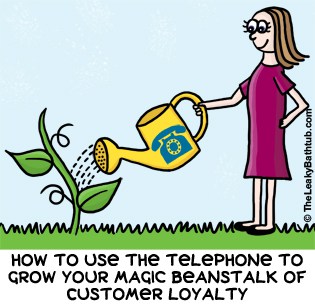
Have you seen photos of those strange-looking stealth jets? You know the ones I mean… they look like one parent was a triangle and the other parent was a square.
These stealth jets travel at super fast speeds (550mph – that’s 890km/h) and they interfere with radar technology to avoid detection to complete their missions…. Whoooosh!
Telephones are much like stealth jets in customer retention
Eh? How can the telephone (developed in the mid 1870s) be like a stealth jet?
It’s because as a marketing tool, the telephone is a little ‘under the radar’. You can communicate directly with your customer – and in a way that new suppliers may not be able to do. They may have to get past their assistant or other gatekeeper first. And, of course, telephone conversations are instant: usually quicker than email, and certainly quicker than a fax, snail mail or face-to-face meeting.
Best of all, phone calls can make an enduring impression – and help you make those sought-after repeat sales.
There are lots of ways you can use the phone to keep in touch with your customers
 You could make a call to your clients in a number of ways that’ll help them climb the magic beanstalk of customer loyalty and grow your customer retention rates:
You could make a call to your clients in a number of ways that’ll help them climb the magic beanstalk of customer loyalty and grow your customer retention rates:
- Touch base to see if there’s anything you can help them with.
- Ask them if they have any questions on a recent job you did for them. (Or if they received their shipment OK.) This is what I call a ‘courtesy call’.
- Pass on some hot industry news that no-one else is privy to.
- Arrange a meeting with them.
- Ask for a sale – or a sales meeting.
- Ask them for feedback or a testimonial.
Let’s look at two of those calls in more detail, and I’ll also share some scripts you can use on these customer retention calls. (I find that many people like the idea of making these kinds of calls, but don’t know what to say on the phone. I know that I get tongue-tied on the phone, so having something written out in front of you can be a good idea.)
1. Courtesy calls: how they work
This is when you call a client who’s recently bought from you (a day or two ago), and you phone to see how they’re getting on. These kinds of calls are so rarely done, that they really make a positive, enduring impression.
For example, several years ago I had a totally new hairstyle. And the receptionist from the hair salon phoned up to see if I was managing my new hairstyle okay. (Yes, this took place many years ago, and I still remember the phone call!)
The same approach can be taken by any business owner: whether you’re selling products or services, a courtesy call will always be appreciated. That way, if there are any issues, you have the opportunity to put them right before issues escalate. You’ll be seen as helpful, proactive and customer-focused. Will that help you get repeat sales? Very likely.
The important thing here is that the person making the call must have the skills or knowledge to deal with any issues that may arise. Unfortunately with the hairdresser example, I did have a question, and the receptionist wasn’t able to answer my question – and my stylist wasn’t on hand to help. So that ruined the effect of the courtesy call: having knowledgeable, helpful people with the authority to deal with matters is vital!
Scripts for courtesy calls
Making this kind of customer retention-focused call is a breeze! Here’s courtesy call script you can use as a starting point:
“Hi, it’s Wilma from ABC Company. This is just a quick call to find out how you’re enjoying XYZ Product/Service you bought from us recently?”
Hint: if the call goes well, ask the client if they’d be happy to give you a testimonial. Offer to write the comments up in email for them to approve, so it’s nice and easy for them. If the client’s happy with your product or service, they’ll say “yes” 99% of the time.
What about if you get voicemail? It can be tempting to hang up, but seeing as you’ve already dialled the number, finish what you started. You could leave a message along the lines of:
“Hi Fred, it’s Wilma from ABC Company. We like to add value and stay in touch with our clients. This is a quick courtesy call to make sure you’re still enjoying XYZ Product/Service you bought from us. If I can be of any further help, please call me on 123-456789. Thanks again for being a client, and please do call me, Wilma, if you need any further help.”
2. Sales calls: how they work – without being sleazy
Whereas courtesy calls are a soft approach, sales phone calls are more to the point.
However, that doesn’t mean they have to be blatant or sleazy. You can still take a customer service angle with the call, so that you position the call as a benefit to the customer, rather than as obviously angling for business.
A client with a dog grooming business does this very well. Just to give you a bit of background on dog grooming: the types of dogs that need hair cuts need it re-done every month or two. Dog hair grows rapidly and can form painful mats if it’s not kept trimmed.
So this client will look through their list of clients from four weeks ago, and will give them a call along the lines of:
“Hi Betty, it’s Wilma from ABC Dog Grooming. It’s been a while since we’ve had little Fluffy in for her groom. Would you like to make another appointment for her?”
More than 80% of clients say “yes” there and then – and then thank the business for making the call. The clients tend to say that they had been meaning to make a booking, but got too busy.
The clients that don’t book while on the phone often don’t have their diaries in front of them, and most of them call back later, also happy that their memory has been jogged. What a great way for the dog grooming business to keep their work schedule full – and at minimal cost! They can do this just by making consistent phone calls… and the clients are grateful for them.
Hint: the script above works well for the dog grooming business. You may need to test and measure different scripts to see what works best for you. For example, instead of asking “would you” (a closed question, that invites only a “yes” or “no” answer), you could change this to “when would you” (an open question). You’ll need to see what’s best for your specific scenario.
We all have things on our To Do list we never get round to
This approach works great for the dog grooming business, but it can work equally well for car mechanics, dentists, beauticians… all those things we need to do (or intend to do) on a regular basis, but don’t get round to.
Those examples are all B2C (business to consumer), but it can work just as well for B2B (business to business). You just need to put your thinking cap on.
What’s more, these calls work equally well for products as for services. When you sell a product, you have a reasonably good idea how long it will last the customer before they need to re-purchase. So give them a call before they run out!
A client of mine who is a wine merchant does very well with this. He gets in touch every so often asking if I need more wine. I’ve said “yes” nearly every time – just because he was asking. He made it easy for me to buy from him, especially because he delivers the wine to my home as part of his service.
So don’t think of these sales calls as sleazy: they’re an essential part of your service to your client.
Imagine if you didn’t make these calls to your clients
If you don’t phone your clients consistently, that’s dangerous. You’re leaving the door wide open for your competitors to swoop in. All they need to do is call your client at the right time, and you could potentially lose that customer. Remember, customers value service and things being easy to buy. So if your competitor does these things better than you, you’re in a danger zone.
But if you do make the calls, they are more likely to buy from you, thus boosting your customer retention rates. And if you’re providing this great service, it’ll help your clients to climb the magic beanstalk of loyalty too.
The same applies to your strategic alliance partners
It’s equally important to call your strategic alliance partners on a regular basis, or again, a competitor might pounce at the opportunity to work with them. This is even more of a danger zone, as you’re not just jeopardising one sale, but a whole series of referrals.
How to avoid the danger zone
How do we get out of that danger zone? You whisk out your stealth jet (a.k.a. telephone) and get that instant connection with your customer… and regularly!
It’s all too easy to get bogged down with work and admin and the million-and-one other things we have to do each day, and push the phone calls to the bottom of the list. You need to get proactive and schedule time each day (or each week) to make those calls.
In fact, you should block out this time in your diary as if it were a face-to-face appointment with a client. After all, it is a one-on-one client meeting, and just because it’s not a physical, in-person meeting, doesn’t mean it’s any less important.
Remember: keep your stealth jet on standby; you’ll need it regularly!
Summary:
- Phoning your customers regularly is essential because:
- You get to connect with them instantly.
- It’s a one-on-one communication medium, so you get their full attention.
- Courtesy calls are easy to make, and an excellent customer service tool. They let you fix problems before they escalate, and can also let you gather testimonials.
- Sales calls can be positioned as customer service calls, and this is probably the most effective way of getting repeat business bar none.
- If you don’t call your clients regularly, you’re leaving the door open for your competitors to swoop in steal your customer.
- Schedule regular calls with your key clients on a daily or weekly basis. Block this time out in your diary.
- Also schedule regular calls with your strategic alliance partners – and again, block out this time in your calendar.



